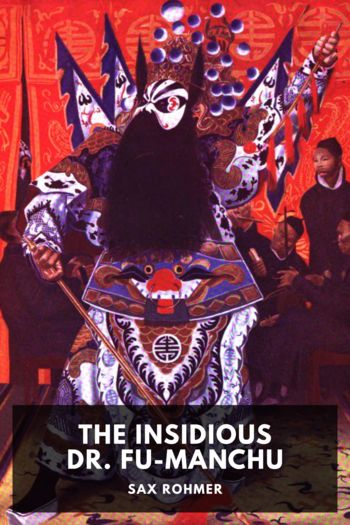The Insidious Dr. Fu Manchu - Sax Rohmer (best ebook reader TXT) 📗

- Author: Sax Rohmer
- Performer: -
Book online «The Insidious Dr. Fu Manchu - Sax Rohmer (best ebook reader TXT) 📗». Author Sax Rohmer
corner of the square and towards the house of Major-General Platt-Houston,
she made the following extraordinary request:
“If you would do me a very great service, for which I always would
be grateful,”—she glanced at me with passionate intentness—“when you
have given my message to the proper person, leave him and do not go
near him any more tonight!”
Before I could find words to reply she gathered up her cloak and ran.
Before I could determine whether or not to follow her (for her words
had aroused anew all my worst suspicions) she had disappeared!
I heard the whir of a restarted motor at no great distance, and,
in the instant that Nayland Smith came running down the steps,
I knew that I had nodded at my post.
“Smith!” I cried as he joined me, “tell me what we must do!”
And rapidly I acquainted him with the incident.
My friend looked very grave; then a grim smile crept round his lips.
“She was a big card to play,” he said; “but he did not know that I
held one to beat it.”
“What! You know this girl! Who is she?”
“She is one of the finest weapons in the enemy’s armory, Petrie.
But a woman is a two-edged sword, and treacherous.
To our great good fortune, she has formed a sudden predilection,
characteristically Oriental, for yourself. Oh, you may scoff, but it
is evident. She was employed to get this letter placed in my hands.
Give it to me.”
I did so.
“She has succeeded. Smell.”
He held the envelope under my nose, and, with a sudden sense of nausea,
I recognized the strange perfume.
“You know what this presaged in Sir Crichton’s case?
Can you doubt any longer? She did not want you to share
my fate, Petrie.”
“Smith,” I said unsteadily, “I have followed your lead blindly
in this horrible business and have not pressed for an explanation,
but I must insist before I go one step farther upon knowing
what it all means.”
“Just a few steps farther,” he rejoined; “as far as a cab.
We are hardly safe here. Oh, you need not fear shots or knives.
The man whose servants are watching us now scorns to employ
such clumsy, tell-tale weapons.”
Only three cabs were on the rank, and, as we entered the first,
something hissed past my ear. missed both Smith and me
by a miracle, and, passing over the roof of the taxi,
presumably fell in the enclosed garden occupying the center
of the square.
“What was that?” I cried.
“Get in—quickly!” Smith rapped back. “It was attempt number one!
More than that I cannot say. Don’t let the man hear.
He has noticed nothing. Pull up the window on your side,
Petrie, and look out behind. Good! We’ve started.”
The cab moved off with a metallic jerk, and I turned and looked
back through the little window in the rear.
“Someone has got into another cab. It is following ours, I think.”
Nayland Smith lay back and laughed unmirthfully.
“Petrie,” he said, “if I escape alive from this business I shall
know that I bear a charmed life.”
I made no reply, as he pulled out the dilapidated pouch and filled his pipe.
“You have asked me to explain matters,” he continued, “and I
will do so to the best of my ability. You no doubt wonder why
a servant of the British Government, lately stationed in Burma,
suddenly appears in London, in the character of a detective.
I am here, Petrie—and I bear credentials from the very
highest sources—because, quite by accident, I came upon a clew.
Following it up, in the ordinary course of routine, I obtained
evidence of the existence and malignant activity of a certain man.
At the present stage of the case I should not be justified
in terming him the emissary of an Eastern Power, but I may say
that representations are shortly to be made to that Power’s
ambassador in London.”
He paused and glanced back towards the pursuing cab.
“There is little to fear until we arrive home,” he said calmly.
“Afterwards there is much. To continue: This man, whether a fanatic
or a duly appointed agent, is, unquestionably, the most malign
and formidable personality existing in the known world today.
He is a linguist who speaks with almost equal facility in any
of the civilized languages, and in most of the barbaric.
He is an adept in all the arts and sciences which a great
university could teach him. He also is an adept in certain obscure
arts and sciences which no university of to-day can teach.
He has the brains of any three men of genius. Petrie, he is
a mental giant.”
“You amaze me!” I said.
“As to his mission among men. Why did M. Jules Furneaux fall
dead in a Paris opera house? Because of heart failure?
No! Because his last speech had shown that he held the key
to the secret of Tongking. What became of the Grand
Duke Stanislaus? Elopement? Suicide? Nothing of the kind.
He alone was fully alive to Russia’s growing peril.
He alone knew the truth about Mongolia. Why was Sir Crichton
Davey murdered? Because, had the work he was engaged upon ever
seen the light it would have shown him to be the only living
Englishman who understood the importance of the Tibetan frontiers.
I say to you solemnly, Petrie, that these are but a few.
Is there a man who would arouse the West to a sense of
the awakening of the East, who would teach the deaf to hear,
the blind to see, that the millions only await their leader?
He will die. And this is only one phase of the devilish campaign.
The others I can merely surmise.”
“But, Smith, this is almost incredible! What perverted genius
controls this awful secret movement?”
“Imagine a person, tall, lean and feline, high-shouldered, with a
brow like Shakespeare and a face like Satan, a close-shaven skull,
and long, magnetic eyes of the true cat-green. Invest him with all
the cruel cunning of an entire Eastern race, accumulated in one
giant intellect, with all the resources of science past and present,
with all the resources, if you will, of a wealthy government—
which, however, already has denied all knowledge of his existence.
Imagine that awful being, and you have a mental picture of Dr. Fu-Manchu,
the yellow peril incarnate in one man.”
I SANK into an arm-chair in my rooms and gulped down a strong
peg of brandy.
“We have been followed here,” I said. “Why did you make no attempt
to throw the pursuers off the track, to have them intercepted?”
Smith laughed.
“Useless, in the first place. Wherever we went, HE
would find us. And of what use to arrest his creatures?
We could prove nothing against them. Further, it is evident
that an attempt is to be made upon my life tonight—
and by the same means that proved so successful in the case
of poor Sir Crichton.”
His square jaw grew truculently prominent, and he leapt stormily to his feet,
shaking his clenched fists towards the window.
“The villain!” he cried. “The fiendishly clever villain!
I suspected that Sir Crichton was next, and I was right.
But I came too late, Petrie! That hits me hard, old man.
To think that I knew and yet failed to save him!”
He resumed his seat, smoking hard.
“Fu-Manchu has made the blunder common to all men of unusual genius,”
he said. “He has underrated his adversary. He has not given
me credit for perceiving the meaning of the scented messages.
He has thrown away one powerful weapon—to get such a message
into my hands—and he thinks that once safe within doors,
I shall sleep, unsuspecting, and die as Sir Crichton died.
But without the indiscretion of your charming friend, I should
have known what to expect when I receive her `information’—
which by the way, consists of a blank sheet of paper.”
“Smith,” I broke in, “who is she?”
“She is either Fu-Manchu’s daughter, his wife, or his slave.
I am inclined to believe the last, for she has no will but
his will, except”—with a quizzical glance—“in a certain instance.”
“How can you jest with some awful thing—Heaven knows what—
hanging over your head? What is the meaning of these perfumed envelopes?
How did Sir Crichton die?”
“He died of the Zayat Kiss. Ask me what that is and I reply
‘I do not know.’ The zayats are the Burmese caravanserais,
or rest-houses. Along a certain route—upon which I set eyes,
for the first and only time, upon Dr. Fu-Manchu—travelers who use
them sometimes die as Sir Crichton died, with nothing to show
the cause of death but a little mark upon the neck, face, or limb,
which has earned, in those parts, the title of the `Zayat Kiss.’
The rest-houses along that route are shunned now.
I have my theory and I hope to prove it tonight, if I live.
It will be one more broken weapon in his fiendish armory,
and it is thus, and thus only, that I can hope to crush him.
This was my principal reason for not enlightening Dr. Cleeve.
Even walls have ears where Fu-Manchu is concerned, so I feigned
ignorance of the meaning of the mark, knowing that he would be
almost certain to employ the same methods upon some other victim.
I wanted an opportunity to study the Zayat Kiss in operation,
and I shall have one.”
“But the scented envelopes?”
“In the swampy forests of the district I have referred to a rare
species of orchid, almost green, and with a peculiar scent,
is sometimes met with. I recognized the heavy perfume at once.
I take it that the thing which kills the traveler is attracted
by this orchid. You will notice that the perfume clings to whatever
it touches. I doubt if it can be washed off in the ordinary way.
After at least one unsuccessful attempt to kill Sir Crichton—
you recall that he thought there was something concealed in his study
on a previous occasion?—Fu-Manchu hit upon the perfumed envelopes.
He may have a supply of these green orchids in his possession—
possibly to feed the creature.”
“What creature? How could any kind of creature have got into Sir
Crichton’s room tonight?”
“You no doubt observed that I examined the grate of the study.
I found a fair quantity of fallen soot. I at once assumed, since it
appeared to be the only means of entrance, that something has been
dropped down; and I took it for granted that the thing, whatever it was,
must still be concealed either in the study or in the library.
But when I had obtained the evidence of the groom, Wills, I perceived
that the cry from the lane or from the park was a signal.
I noted that the movements of anyone seated at the study table
were visible, in shadow, on the blind, and that the study occupied
the corner of a two-storied wing and, therefore, had a short chimney.
What did the signal mean? That Sir Crichton had leaped up from
his chair, and either had received the Zayat Kiss or had seen the thing
which someone on the roof had lowered down the straight chimney.
It was the signal to withdraw that deadly thing. By means of
the iron stairway at the rear of Major-General Platt-Houston’s, I
quite easily, gained access to the roof above Sir Crichton’s study—
and I found this.”
Out from his pocket Nayland Smith drew a tangled





Comments (0)